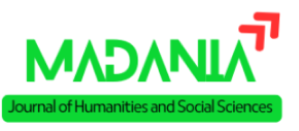Evaluasi Penerapan Halal Assurance System (HAS) dalam Proses Penyembelihan Ayam
DOI:
https://doi.org/10.59240/kjsk.v5i3.162Keywords:
Halal Assurance System, Halal Certification, Poultry Slaughtering, Halal GovernanceAbstract
This study aims to evaluate the implementation of the Halal Assurance System (HAS) in poultry slaughtering practices. The research focuses on assessing the conformity of the slaughtering process with HAS standards and identifying factors that influence the effectiveness of its implementation. A qualitative approach with a case study design was employed, involving data collection through observation, in-depth interviews, and documentation using triangulation techniques. Data were analyzed descriptively through the processes of reduction, presentation, and conclusion drawing. The results indicate that the implementation of HAS has been carried out in accordance with Islamic principles, including the recitation of basmalah, the orientation toward the qibla, and the cutting of the three vital channels. However, weaknesses remain in documentation, internal audit routines, and staff training. These findings highlight the importance of comprehensive halal assurance implementation to ensure compliance with Islamic law while enhancing consumer trust in animal-based products. This study is expected to contribute to the strengthening of halal governance within the poultry slaughtering industry in Indonesia.
References
Adam, P. A. (2022). Kedudukan sertifikasi halal dalam sistem hukum nasional sebagai upaya perlindungan konsumen dalam hukum Islam. Amwaluna: Jurnal Ekonomi dan Keuangan Syariah, 1(1), 150–165. https://doi.org/10.29313/amwaluna.v1i1.2172
Agus, P. A. (2022). Kedudukan sertifikasi halal dalam sistem hukum nasional sebagai upaya perlindungan konsumen dalam hukum Islam. Amwaluna: Jurnal Ekonomi dan Keuangan Syariah, 1(1), 150–165. https://doi.org/10.29313/amwaluna.v1i1.2172
Alifia, D. R., Kurniawan, A., & Nuraini, L. (2023). Implementation of halal product assurance through halal certification as service quality in food and beverage products. Jihbiz: Jurnal Ekonomi, Keuangan dan Perbankan Syariah, 7(2), 124–137. https://doi.org/10.33379/jihbiz.v7i2.2817
Creswell, J. W., & Poth, C. N. (2018). Qualitative inquiry and research design: Choosing among five approaches (4th ed.). SAGE Publications.
Efendi, A. M. (2022). MINAN HALAL (SJH) pada usaha makanan siap saji (studi kasus Herbal Ahmad Muzaeni Arif Efendi). [Unpublished manuscript].
Faturohman, I. (2019). Faktor yang mempengaruhi minat beli terhadap makanan halal: Studi pada konsumen Muslim di Indonesia. Prosiding Industrial Research Workshop and National Seminar, 10(1).
Febriadi, S. R. (2022). Aplikasi maqashid syariah dalam bidang perbankan syariah. Amwaluna: Jurnal Ekonomi dan Keuangan Syariah, 1(2), 231–245. https://doi.org/10.29313/amwaluna.v1i2.2585
Habibi, A., Salsabila, S., & Aslikhah, A. (2024). Analisis penerapan sertifikasi halal dalam industri kemasan plastik PT. Sentral Box Tradeindo. JUEB: Jurnal Ekonomi dan Bisnis, 3(4), 28–35.
Iltiham, M. F., & Nizar, M. (2020). Pengaruh label halal Majelis Ulama Indonesia (MUI) dan harga pada oleh-oleh makanan khas Pasuruan terhadap minat beli dan keputusan pembelian. Malia, 11(2), 311–326. https://doi.org/10.35891/ml.v11i2.2149
Lembaga Pengkajian Pangan, Obat-obatan, dan Kosmetika Majelis Ulama Indonesia (LPPOM MUI). (2020). Pedoman sistem jaminan halal (HAS 23103): Persyaratan rumah potong hewan dan rumah potong unggas (Edisi Revisi). LPPOM MUI.
Ma’rifat, T. N., & Sari, M. (2022). Penerapan sistem jaminan halal pada UKM bidang olahan pangan hewani. Khadimul Ummah, 1(1). https://doi.org/10.21111/ku.v1i1.1421
Miles, M. B., Huberman, A. M., & Saldaña, J. (2014). Qualitative data analysis: A methods sourcebook (3rd ed.). SAGE Publications.
Nadya, A. Q., Anwar, S., & Rahmawati, F. (2023). Pendampingan sertifikasi halal UMKM Desa Pondokagung Kecamatan Kasembon Kabupaten Malang. Jurnal Penelitian dan Pengabdian Masyarakat, 1(1), 1–9. https://doi.org/10.61231/jp2m.v1i1.25
Nur, Y. N. W., Aslikhah, A., Dayat, M., & Sukamto, S. (2023). Kajian hukum Islam dalam praktik jual beli sistem tebasan. Ekomadania, 7(1), 1–13.
Pratama, Y. N. W., Aslikhah, A., Dayat, M., & Sukamto, S. (2023). [Artikel dalam Ekomadania, 7(1), 1–13].
Riaz, M. N., & Chaudry, M. M. (2022). General guidelines for halal food production. In Handbook of halal food production (pp. 17–28). CRC Press. https://doi.org/10.1201/9781315119564-3
Rony, E. F. (2022). Analisis model kehalalan proses potong ayam di rumah tangga pemotongan unggas. Politeknik Negeri Samarinda Proceedings, 19–25.
Salam, D. Q. A., & Makhtum, A. (2022). Implementasi jaminan produk halal melalui sertifikasi halal pada produk makanan dan minuman UMKM di Kabupaten Sampang. Qawwam: The Leader’s Writing, 3(1), 10–20. https://www.jurnalfuad.org/index.php/qawwam/article/view/110
Tian, N. M., & Sari, M. (2022). Penerapan sistem jaminan halal pada UKM bidang olahan pangan hewani. Khadimul Ummah, 1(1). https://doi.org/10.21111/ku.v1i1.1421
Yaqin, A. (2022). Halal di era modern: Kupas tuntas halal haram produk pangan, obat, dan kosmetik di sekitar kita. Surabaya: MUI Jawa Timur.
Yin, R. K. (2018). Case study research and applications: Design and methods (6th ed.). SAGE Publications.
Downloads
Published
How to Cite
Issue
Section
License
Copyright (c) 2025 habibi04_Uyp Sholeh

This work is licensed under a Creative Commons Attribution-NonCommercial-ShareAlike 4.0 International License.






